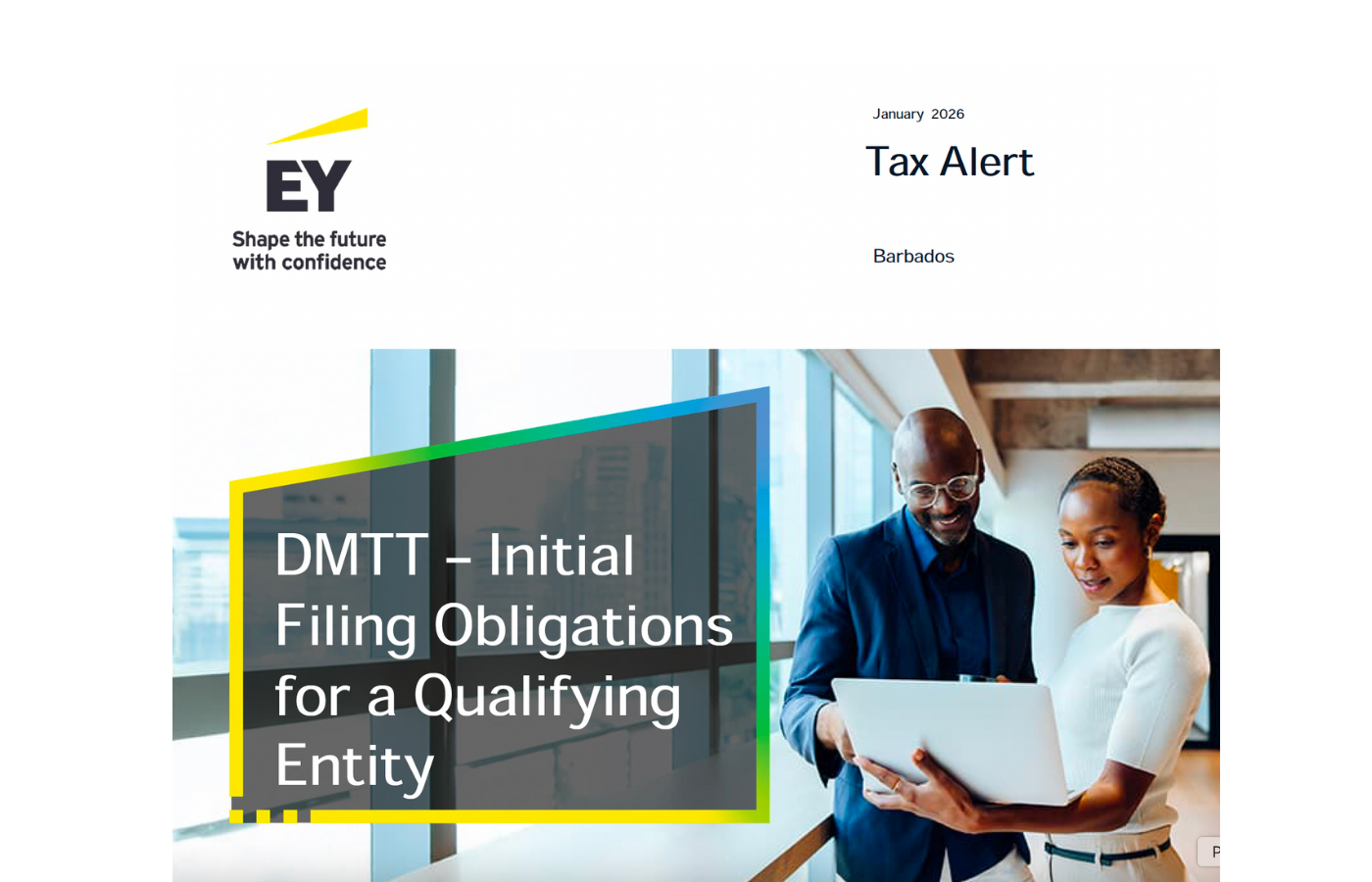-29.avif)
The following news release was prepared by Ernst & Young Services Ltd:
Barbados Announces Pillar Two Proposals
In a Ministerial Statement before Parliament on 7 November 2023, the Prime Minister of Barbados, the Hon. Mia Amor Mottley, S.C., M.P. announced that in the context of a changing international tax landscape and in response to Pillar Two of the Base Erosion and Profit Shifting Initiative, the country will embrace and invest in global competitiveness via the following initial changes to its tax regime.
1. Increased Corporation Tax Rate
The Barbados Income Tax Act will be amended with effect from income year 2024 and specifically from 1 January 2024 to revise the rate of corporation tax to 9%. However, this rate will not apply to the following classes of entities:
a. Businesses with revenue at or below BBD2 million which are registered under the Small Business Development Act – These entities will be subject to corporation tax at the rate of 5.5%.
b. Insurance entities – These entities will continue to be subject to tax at the current rates of 0% for Class 1 Licensees and 2% for Class 2 and 3 Licensees.
c. Shipping entities – These entities are out of scope of Pillar Two rules and will continue to be subject to the existing regime of 5.5% - 1% depending on their level of income. Further evaluation will occur to determine whether change will be required for fiscal year 2025 and after.
Where applicable, the new rates of tax will apply to income earned from 1 January 2024.
2. A Qualified Domestic Minimum Top-Up Tax (QDMTT)
With effect from income year 2024 and specifically 1 January 2024, a QDMTT will be implemented. The QDMTT will top-up the Barbados effective corporation tax payable by an in-scope multinational enterprise to 15%.
The top-up tax will not apply to in-scope multinational enterprises where the Ultimate Parent Entity is in a jurisdiction which has not implemented an Income Inclusion Rule (IIR) or where the Constituent Entities are not subject to an IIR or an Undertaxed Profits Rule (UTPR).
The QDMTT will qualify for the “Safe Harbour” under Pillar Two rules.
3. Qualifying Refundable Tax Credits
In addition to existing tax allowances, which will be maintained, Qualified Refundable Tax Credits will be introduced. These credits can be offset against any tax liability other than Corporation Tax or other Covered Taxes that are due. The credits would be available only to in-scope entities which are subject to the 9% corporation tax rate and the QDMTT and would be available for offset against future taxes within a consecutive four-year period only.
The Prime Minister outlined the following initial credits:
a. Qualified Job Credit
In sectors pertaining to fintech activities, wholesale distribution and trading without physical inventory or storage in Barbados as well as research and development within any industry, a refundable payroll tax credit on eligible payroll costs will be introduced. The maximum effective payroll credit should not exceed 300%.
• “Eligible payroll costs" means the expenditures for salaries, wages as well as other employee benefits or remuneration such as medical insurance, National Insurance contributions, payments to a pension fund or other retirement benefits, bonuses and allowances payable to eligible employees.
• “Employees” means a full time “employee as defined under Section 85(1) of the Income Tax Act, Cap. 73.
• “Research and Development” activities include carrying out basic research, applied research or experimental research to innovate and introduce new products and services approved by Ministerial Order from the Ministry of Finance.
For the purposes of the Qualified Jobs Credit, the credit will be calculated on the average payroll cost on the sliding scale is as follows:
• For the first 50 employees a credit of 75%
• For 51 employees to 100 employees 175%
• For 101 employees to 150 employees 300%
• For 151 employees to 200 employees 400%
• Over 200 employees 475%
b. Research and Development Credit
A credit of 50% of qualifying expenses incurred for qualifying research & development activities will be allowed in addition to the Qualified Jobs Credit. This credit may be made available to any company in Barbados, which carries out basic research, applied research or experimental research to innovate and introduce new products and services approved by Ministerial Order from the Ministry of Finance in prescribed sectors.
Qualifying expenses include expenses for plant, equipment, materials and assets used in qualified research & development activities, outsourcing expenses and local overhead expenses that support these activities.
c. National Development Credit
A credit will be developed for investment in national development projects for low-income housing, historic buildings, public medical facilities including hospitals and polyclinics, hospices and schools up to the tertiary level. This credit will be designed with extensive consultation.
It is anticipated that credit mechanisms relevant to the blue and green economies will be announced in the 2024-25 Financial Statement by the Minister of Finance.
4. Monthly Prepayments of Tax
From Income Year 2024 and specifically from 1 January 2024, in-scope entities will be required to pay corporation tax on a monthly basis. The first payment will take place at the end of January 2024. All other entities with the exception of small business companies registered under the Small Business Act will be required to prepay in monthly installments with effect from Income Year 2025 and specifically as of 1 January 2025.
Monthly prepayments for the fiscal year will be calculated based on the previous year’s tax base multiplied by the new applicable rate, net of the impact of the tax credits mentioned in the following section where relevant.
5. Administration/Regulation
The Barbados Revenue Authority will be responsible for the administration of the Qualified Domestic Minimum Top-up Tax. More specifically, the Authority will administer the calculation of the tax base, control, determination, collection as well as the recovery of the top-up tax.
Prepared by Ernst & Young Services Ltd.
Contact the EY Barbados team for more information.















-66.avif)
-4.avif)
-3.avif)
-60.avif)



-40.avif)
-35.avif)
-31.avif)
-22.avif)
-14.avif)
-2.avif)
.avif)
-2.avif)


-50.avif)
-35.avif)
-28.avif)
%20(1400%20%C3%97%20900%20px).avif)
-20.avif)



























